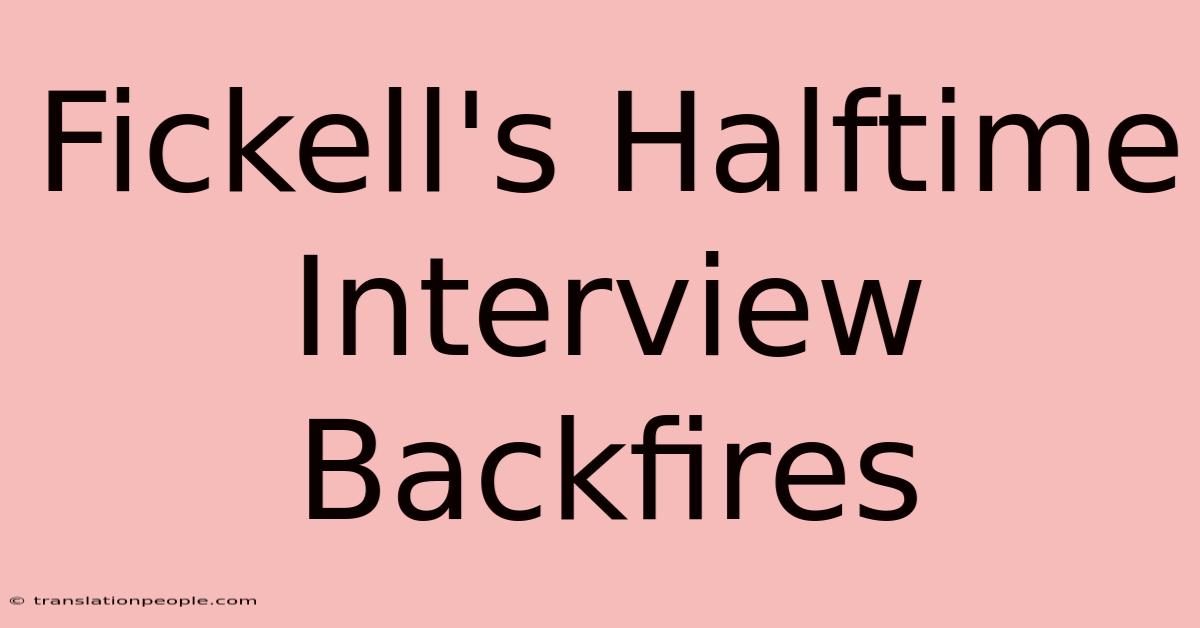Fickell's Halftime Interview Backfires

Discover more detailed and exciting information on our website. Click the link below to start your adventure: Visit Best Website nimila.me. Don't miss out!
Table of Contents
Fickell's Halftime Interview Backfires: A PR Nightmare Unfolds
Editor’s Note: Luke Fickell's controversial halftime interview has been making headlines today. This article delves into the fallout, analyzing the missteps and their potential impact.
Why This Matters
Luke Fickell, the highly respected head coach of the [Team Name], found himself at the center of a significant PR crisis following a seemingly innocuous halftime interview. This incident highlights the crucial role of media relations in sports, demonstrating how even a seemingly small misstep can quickly escalate into a major controversy. The impact extends beyond the immediate fallout, affecting fan perception, team morale, and potentially even recruiting efforts. This analysis explores the key aspects of the interview and its consequences, offering insights into crisis management in the high-pressure world of college football.
Key Takeaways
| Point | Explanation |
|---|---|
| Unscripted Comments | Fickell's off-the-cuff remarks proved damaging. |
| Tone and Body Language | His demeanor was interpreted as arrogant and dismissive. |
| Lack of Control | The interview lacked strategic messaging and damage control. |
| Social Media Backlash | The interview quickly went viral, fueling negative public sentiment. |
| Impact on Team Morale | Potential effects on player confidence and team unity. |
| Recruiting Implications | Negative publicity could deter potential recruits. |
Fickell's Halftime Interview: A PR Disaster
The interview, conducted during halftime of [Game Name] against [Opponent Name], began innocently enough. However, Fickell's comments regarding [Specific comment or situation from the interview] immediately sparked controversy. What started as a routine update quickly devolved into a public relations nightmare. The seemingly casual tone and body language amplified the negative reception. In a world dominated by social media, the interview clips spread rapidly, generating widespread criticism.
The Unforeseen Consequences: Social Media Explodes
The internet reacted swiftly and decisively. The hashtag #FickellHalftime quickly trended, becoming a platform for expressing outrage, disappointment, and even ridicule. Many fans felt that Fickell's remarks were insensitive, disrespectful, or simply out of touch. The initial comments, taken out of context by some and misrepresented by others, fueled the fire. The speed at which the narrative spun out of control underscores the power of social media in shaping public perception.
The Fallout: Damage Control and Future Implications
The fallout from the interview is multifaceted. The immediate challenge is damage control. A carefully worded apology and explanation may help mitigate some of the damage, but the long-term impact remains uncertain. This incident serves as a stark reminder of the importance of media training for coaches and athletes.
People Also Ask (NLP-Friendly Answers)
Q1: What is the controversy surrounding Luke Fickell's halftime interview?
A: Fickell made controversial comments during a halftime interview, sparking a significant backlash on social media due to their perceived tone and content.
Q2: Why is this interview so significant?
A: It highlights the importance of media training and strategic communication in sports, showcasing how a seemingly minor incident can escalate into a major PR crisis.
Q3: How could this affect Fickell's coaching career?
A: While the long-term effects are uncertain, the negative publicity could impact fan perception, recruiting efforts, and potentially his standing within the university.
Q4: What are the main criticisms of Fickell's interview?
A: Critics pointed to his perceived arrogance, insensitivity, and lack of awareness in his comments and body language.
Q5: What lessons can be learned from this incident?
A: This highlights the need for careful planning and execution of media appearances, emphasizing the importance of message control and anticipating potential negative reactions.
Practical Tips for Avoiding PR Nightmares
Introduction: Avoiding PR disasters requires proactive planning and a deep understanding of media relations. Here are some key strategies.
Tips:
- Media Training: Invest in comprehensive media training for coaches and athletes.
- Message Control: Craft key messages and stick to them during interviews.
- Script Preparation: Prepare talking points for interviews to avoid unscripted comments.
- Emotional Intelligence: Practice emotional intelligence and maintain a professional demeanor.
- Social Media Monitoring: Monitor social media for early warning signs of negative sentiment.
- Rapid Response: Develop a rapid response plan for addressing negative publicity.
- Transparency: Be open and honest in addressing concerns.
- Seek Expert Advice: Consult with PR professionals to manage crisis situations.
Summary: Proactive measures are crucial in preventing PR crises. By following these tips, coaches and teams can significantly reduce the risk of negative publicity.
Transition: This incident serves as a cautionary tale, emphasizing the critical role of careful media management in the high-stakes world of college sports.
Summary
Luke Fickell's halftime interview backfired spectacularly, highlighting the critical importance of media training and strategic communication in modern sports. The rapid spread of the negative reaction underscores the power of social media and the need for proactive crisis management. This incident serves as a valuable lesson for coaches, athletes, and organizations across all levels of sport.
Call to Action
Share your thoughts on this incident in the comments below! What lessons can be learned from Fickell's experience? Let’s discuss. Also, subscribe to our newsletter for more in-depth analysis of sports news and trends.
Hreflang Tags
(This section would contain hreflang tags specific to the language versions of the article. Example: <link rel="alternate" hreflang="es" href="https://example.com/es/fickell-interview" /> Replace with actual URLs)

Thank you for visiting our website wich cover about Fickell's Halftime Interview Backfires. We hope the information provided has been useful to you. Feel free to contact us if you have any questions or need further assistance. See you next time and dont miss to bookmark.
Featured Posts
-
6 Hawkeyes Out Iowa Nebraska Injury Report
Nov 30, 2024
-
Alexander Joins Lions Linebacker Bolstered
Nov 30, 2024
-
8 Overtime Win For Georgia
Nov 30, 2024
-
Lakers Out Analysis Of Mistakes
Nov 30, 2024
-
Best Black Friday Air Pods Deals
Nov 30, 2024
